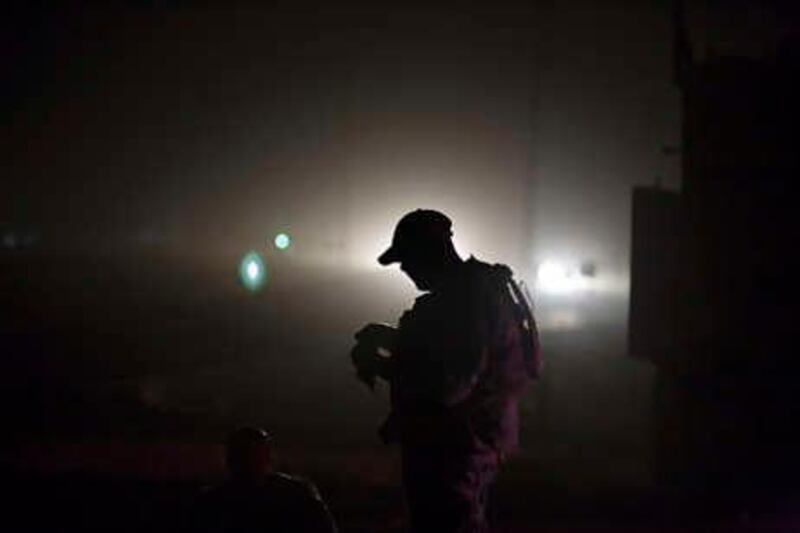BAGHDAD // When he started work as in interpreter for the US army, Bob - as he was quickly nicknamed by the soldiers in his unit - was convinced the Americans had come to stay. Washington would garrison the country as it had western Europe during the Cold War and would never really hand it back, he thought. A Christian from northern Iraq, Bob did not see a permanent occupation as necessarily a bad thing, as long as it resulted in some prosperity, stability and a modern government for his people.
That was back in 2007, when Iraq was tearing itself apart and George W Bush was in the White House. With the heat now rising to the insufferable temperatures of an Iraqi summer, Bob, and other Iraqi interpreters with the United States military, have been watching US troops pack-up their equipment and prepare to scale back their presence, with a deepening sense of unease. "They're going to leave us behind, I can see that now," he said. "I never thought this day would come and even when [president] Obama said they'd pull-out, I believed all the promises from the soldiers that they'd take us with them, that we were their brothers, their buddies, their guys.
"But now they're going and it's obvious they're not going to take us. We'll be left here, we'll be hung out to dry, we'll be [expletive]." In his late 20s with a wife and two young children, Bob is one of an estimated 6,000 Iraqi interpreters currently contracted to work for the US military. Their numbers are likely to be reduced as the US army cuts its strength in Iraq to 50,000 combat troops by the end of August, ahead of a total withdrawal scheduled to have taken place by the start of 2012.
Which means the interpreters are now facing two problems - the immediate prospect of joining Iraq's massed ranks of unemployed and the longer-term worry of being left at the mercy of militants who have vowed to hunt them down and kill them as traitors. Countless numbers of interpreters or their family members have already lost their lives to violent extremists or insurgent attacks. There are no accurate records for how many have been killed but The List Project, a US-based advocacy group that has helped resettle 700 Iraqis to the United States, believes that thousands have died.
"It's a bad situation," Bob said in a telephone interview from the outskirts of Mosul, in Ninewah province, on Tuesday. "Yesterday I watched on TV as some guy from al Qa'eda said they will follow the 'terps when the Americans leave, and kill us all. "I'm sure he wasn't joking but no one seems to care. The Iraqi government doesn't give a damn about us and I've come to realise that the Americans don't either."
The US government has already resettled 35,000 Iraqi asylum seekers, and continues to process applications from those who have worked on behalf of the United States, under a Special Immigrant Visa (SIV) scheme. A total of 20,000 Iraqis - 5,000 per year between 2008 and 2012 - are to be given permission to live in the US. But Washington has been criticised for the slow rate of processing SIVs and for capping the numbers - as many as 70,000 Iraqis are estimated to have worked for the US since the 2003 invasion. Campaigners continue to urge the government to draw up a specific and comprehensive evacuation plan for all Iraqi employees.
Bob himself decided to apply for SIV at the end of last year and enlisted the help of a US army captain who said he would assist in completing the complex paperwork and getting the necessary testimonies and recommendations from senior officers. "I spoke to the captain last week about it and he said 'I lost your papers'," Bob explained. "What can I say to that? You can't argue with an army officer, there's nothing I can do but I'm really angry about it."
Other interpreters interviewed by The National made similar complaints, saying that while in theory they were able to apply for SIVs, in practice the army units they were attached to showed little interest in following through on promises to deal with paperwork. "I sent in my papers [for an SIV] a year and a half ago and have heard nothing back," said Abu Mohammad, a former English teacher from Baghdad who has worked with US troops for five years. "When I talk to the soldiers or officers to follow the matter up, they laugh at me or brush me off.
"I've lost count of how many times different army units have promised to help me and my family, they've all promised not to forget me. Then they leave the country and I never hear from them again." Abu Mohammad said he was grateful to the US military for giving him a job, and that he had enjoyed working with American soldiers, despite the difficulties. A resident of Sadr City, a stronghold of the anti-US Sadrist movement, Abu Mohammad said he had been forced to all but sever contacts with Iraqis because of his work, fearing for his life. The increasing power of the Sadrists following the March election has only added to his sense of vulnerability.
"I still hope that the US government will see the seriousness of our situation and give us its hand in friendship," he said. "I hope my visa gets approved. But as the days pass I'm more and more afraid that won't happen." @Email:nlatif@thenational.ae psands@thenational.ae





